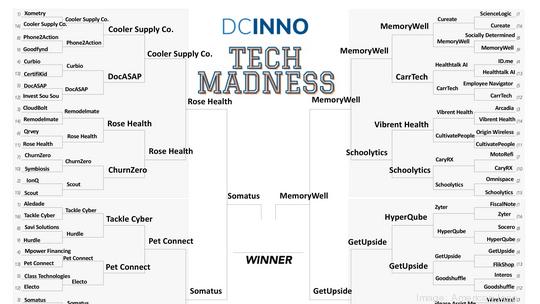It’s time for tipoff.
This March in the D.C. area brings spring, sports and sunshine — as the region defrosts from a snow-covered winter and looks forward to a warmer, brighter season. It also means it’s once again time to introduce Tech Madness, our annual bracket-style competition to highlight the action and activity that has come to define our innovation economy.
Update: The Final Round
We set out more than a month ago to find the 2021 Tech Madness champion — and with help from you, our readers, we have crowned a victor.
Update: Round 5
And just like that, we’re down to two companies fighting for the Tech Madness title.
D.C. storytelling startup MemoryWell (No. 9) now faces McLean kidney care company Somatus (No. 3) in the championship.

It wasn’t an easy road, but a hard-fought battle. In the previous round, MemoryWell took 51.9% of the vote to barely beat GetUpside (No. 4), and Somatus secured 56.7% of the vote to edge out Rose (No. 11) — an early favorite as a top vote-getter.
The tournament has racked up 37,710 votes so far, with a whopping 9,933 votes from Round 5 alone.
Update: Round 4
If it wasn’t clear before, here’s confirmation: Tech Madness is anybody’s game.
We’re down to the final four companies in this year’s bracket competition.
D.C. mental health startup Rose Health (No. 11) now faces McLean kidney care company Somatus (No. 3), and District storytelling platform MemoryWell (No. 9) competes against D.C. e-commerce tech firm GetUpside (No. 4). The winner of each matchup goes to the finals.
Now, for the stats: The bracket had racked up a total 28,456 votes prior to Friday — and that’s sure to further climb as the stakes also rise.
Rose, with 2,156 votes, and Somatus, with 2,254 votes, racked up the most votes in the previous round. So their showdown could be tight.
It’s also worth noting three of the four remaining contenders operate in and around the health care space, after a year in which all eyes zeroed in on the industry.
Update: Round 3
The competition is heating up.
We’ve had 22,586 total votes so far and, still, the underdogs are in it to win it.
Round 3 saw a close call, with No. 4 seed GetUpside barely edging out No. 9 seed HyperQube — by only six votes. No. 4 seed Somatus racked up 900 votes, making it the one to beat. And Cooler (No. 16) and Schoolytics (No. 15) remain the ones to watch.
Could we have a Cinderella story this year?
Update: Round 2
We’re down to 16 teams in the tournament.
The one to beat? Rose Health. The D.C. mental health startup was the top vote-getter with 1,640 votes in Round 2 — out of 17,200 total votes in the tournament so far.
The closest call came between Arrow, seeded No. 15, beating Protocol by a mere 15 votes.
And the ones to watch? Underdogs Cooler (No. 16), Tackle Cyber (No. 16) and Schoolytics (No. 15). We’ll find out if they have what it takes.
Update: Round 1
The first round of Tech Madness 2021 has officially closed and 32 companies have advanced. It was, in a nutshell, the round of the upsets.
Now for some stats. Every top seed is out.
The trend continued for the bracket’s smaller and earlier-stage startups, with underdogs representing 75% of the companies that moved to Round 2. That meant saying goodbye to reigning champ Goodfynd and a handful of other returning competitors.
We also saw some close races, with Live Chair Health, Base Operations and Healthtalk A.I. winning their matchups by thin margins.
The playbook
We’ve scouted the region’s startup ecosystem over the last year. We’ve watched players score and strategize, penetrate and pivot, defend and dance as they navigate industries and arenas challenged by the pandemic.
With your help, we identified 64 private, bootstrapped and venture-backed tech companies poised to make moves this year and beyond, putting them in contention for the 2021 title. We’ve seeded them based on factors including funding raised, size, stage, headcount and other growth metrics, and created the matchups accordingly.
So, over the next few weeks, those competitors will face off and we invite you — our readers — to vote to determine who moves to the next round.
The game plan
Consider the following: Who would you invest in? Think about the enterprises you’d back — for the fastest return, the safest bet or the long game. Pick the models you think will succeed, or the missions you want to see succeed. Vote for your own company, the ones you’ve rooted for from afar, or the ones you’re just now discovering (more on all of them below). It’s up to you. And keep in mind: A vote for one company is not vote against another; rather, the challenge aims to build awareness and excitement for the region’s tech universe and the companies that make it what it is, through a little healthy — and friendly — competition.
Food truck discovery startup Goodfynd took the trophy last year. Real estate tech company Homesnap was crowned victor the year before. And they’re part of a much larger alumni network of champions that tournament fans will remember. ICYMI: You can check those out here.
The rulebook
Be sure to share the bracket with your networks and mark your calendars or bookmark this post so you can track each round. And you can follow it all in our twice-weekly newsletter, The Beat. Here’s the full schedule:
- Round 1 voting March 9-14
- Round 2 voting March 15-18
- Round 3 voting March 19-22
- Round 4 voting March 23-25
- Round 5 voting March 26-29
- Round 6 voting March 30-April 1. We’ll announce the champion April 2
The roster
This year’s group includes some teams familiar to the contest and many more appearing for the first time, from established to nascent businesses. Here’s the complete list, alphabetically.
- Aledade: The fast-growing Bethesda primary care company is expanding its value-based care model, which it helps physician practices implement by building accountable care organizations.
- Arcadia: The D.C. clean energy startup is working to get its data billing platform to more consumers as a tool to manage their utility accounts.
- Arrow: The Ashburn startup functions as an educational and family support system during and after pregnancy, provides on-demand childbirth and new parenting courses, and one-on-one consultations.
- Babyscripts: The D.C. maternal health startup’s virtual obstetrics platform connects pregnant patients with their doctors.
- Base Operations: The D.C. safety and security startup launched a new threat-mapping platform earlier this year, as it looks to develop its product and continue scaling its global footprint.
- CarrTech: The local medical device startup, based in upper Montgomery County, is developing a filter needle system that makes what’s now a multistep process required for administering liquid pharmaceuticals with a needle safer and faster.
- CaryRx: The District-based digital pharmacy startup is expanding its same-day prescription delivery service to get more patients their medications and position itself to grow as the Covid-19 pandemic increases the appetite for health-related digital tools.
- CertifiKid: The Potomac family deals startup, with an e-commerce discount marketplace for parents and kids’ activities, is adapting its business to a Covid-era landscape with new offerings and a new acquisition under its belt.
- ChurnZero: The D.C. software firm has a platform to help reduce customer loss and boost retention for its client companies by engaging customers and identifying those the company needs to work to keep.
- Class Technologies: Formerly ClassEDU, the new ed-tech startup allows teachers using Zoom to proctor live tests, have one-on-one conversations, take attendance, distribute assignments and other tasks that are taken for granted during in-person learning.
- CloudBolt: The Rockville startup has a cloud-management software for customers across industries including government, health care, financial services, retail and manufacturing, among others.
- Cooler Supply Co.: The D.C. startup provides a subscription box service to employers, to improve morale, foster team building and keep employees engaged as they work from home in the age of coronavirus.
- CultivatePeople: The D.C. software company provides compensation consulting and other HR services to startups and emerging tech companies to help them retain employees.
- Curbio: The Potomac company covers the cost of home renovations to boost sale prices, working with real estate agents to handle upgrades to homes slated for sale to increase the home’s value before it hits the market.
- Cureate: The D.C. company, founded in 2014 and part of Halcyon Incubator’s latest cohort, offers entrepreneurship education, as well as other products and services for the food and beverage industry.
- DocASAP: The Herndon patient-engagement startup has a telemedicine and online scheduling platform it’s now expanding.
- Edgybees: The Gaithersburg geotagging startup is now focusing on product innovation, global adoption and an aggressive hiring strategy as it looks to meet the needs of the defense and public safety sectors.
- Electo: The D.C. startup collects primary source information about candidates and elected officials for a free app, and is building a subscription model for corporations, nonprofits, elected officials, congressional offices, state legislators, advocacy groups and organizations.
- Employee Navigator: The Bethesda human resources software company sells its benefits and HR products to insurance brokers and employers across the country.
- Expel: The cybersecurity startup provides a security operations center as a service for other companies from a recently expanded Herndon HQ.
- FiscalNote: The D.C. software company has a regulatory dashboard to help clients track and take action on laws and regulations.
- FlikShop: The D.C. tech startup’s “Instagram for prison” turns digital messages into postcards for incarcerated family members, alongside other services the business has rolled out since its 2012 founding.
- GetUpside: The District-based e-commerce tech firm offers customers personalized cash-back deals to shop at partner brick-and-mortar businesses in major markets around the country.
- GiveCampus: The D.C. fundraising startup works with colleges, universities and other academic institutions to raise money through its platform.
- Goodfynd: This software-as-a-service startup based in the District çhas a platform that connects customers with nearby food trucks.
- Goodshuffle: The D.C. company runs an online marketplace for event planning firms to run their businesses.
- Healthtalk A.I.: The Reston virtual care startup’s platform facilitates communication between physicians and their patients to address gaps in care.
- Hurdle: Formerly Henry Health, the D.C. startup provides teletherapy services and tools for diverse populations often underserved by traditional resources.
- HyperQube: The Arlington firm enables companies to replicate an entire information technology network with its tool.
- ID.me: The McLean identity management company provides secure identity proofing, authentication and group affiliate verification for government and business.
- Interos: The Arlington risk management platform uses machine learning to develop complex databases of supplier relationships to track companies’ supply chains and assess risk factors.
- Invest Sou Sou: The D.C.-based savings platform that partners with community banks allows users to deposit money into an app and team up with friends and family to meet specific savings goals.
- IonQ: The College Park quantum technology firm — which announced March 8 its intent to file for an IPO through a merger with special purpose acquisition company, or SPAC — develops high-performance quantum computers that rely on the physics of atomic particles, capable of solving complex problems that conventional computers currently cannot.
- JuneBrain: The Rockville medical device startup is developing a wearable imaging device for patients with multiple sclerosis that monitors disease activity.
- Live Chair Health: The D.C.-area startup, now headquartered in Baltimore after launching in the District, aims to improve health outcomes for the African American community through barbershop visits.
- MemoryWell: The D.C. storytelling startup allows seniors and their families to build timelines of their lives with photos, videos, letters and other elements, while connecting them with professional writers, who interview them and write the stories — to better introduce dementia patients to their caregivers and, in doing so, improve care.
- MotoRefi: The Arlington auto refinancing startup seeks to make it easier for consumers to refinance their car loans.
- MPower Financing: The District fintech startup finances loans largely for international students coming to the U.S. and Canada for college degrees.
- Omnispace: The Tysons satellite company aims to create seamless 5G connectivity to companies that operate across urban and more rural areas across the world.
- Origin Wireless: The Greenbelt-based wireless tech startup provides wireless sensing and tracking technology that allows users to build applications in areas of health, smart home, indoor tracking and others at a lower cost.
- Pet Connect: The company serves vets, groomers and pet stores with a business management software, and pet owners with an online marketplace.
- Phone2Action: The Arlington civic engagement startup serves nonprofits, associations and corporations with software to build advocacy and public policy programs.
- Pie Insurance: The D.C. workers' compensation startup has a special brand of online insurance policies for small businesses.
- Please Assist Me: The D.C.-based home management app coordinates errands with a personal assistant, from grocery delivery to prescription pickup, and partners with apartment buildings to offer the service to their residents.
- Poppy: The D.C. wedding flower startup, from the former head of products for UrbanStems, walks customers through the flower design and delivery process for weddings and events.
- Protocol: The digital media company from media executive and Politico Publisher Robert Allbritton launched in early 2020 and covers the intersection of tech and policy.
- Qrvey: The Tysons analytics startup’s software positions software-as-a-service companies to give their users custom dashboard features that, thanks to Qrvey, they don’t have to build themselves.
- Radius Networks: The Georgetown-based tech company provides a proprietary location technology to companies.
- Remodelmate: The District remodeling management firm guides users through the home renovation process.
- Rose Health: The D.C. startup helps doctors identify mental health symptoms and get their patients necessary care.
- Savi Solutions: The District-based online platform, sort of a TurboTax for student loans, gives borrowers a breakdown of available options around repayment and forgiveness.
- Schoolytics: The D.C. analytics platform measures and manages student engagement for classrooms.
- ScienceLogic: The Reston software firm allows customers to monitor applications and systems across their networks, including how they interact, helping to predict outages and issues and even to provide fixes in a more automated way.
- Scout: The Alexandria company serves insurers, manufacturers, research, government and operators with on-site satellite inspections.
- Socially Determined: The D.C. analytics startup helps organizations better understand the health and social risks of the people they care for, most recently with tools for health systems, government and other responders to identify populations that are most vulnerable to the effects of Covid-19.
- Somatus: The McLean kidney care startup is expanding its comprehensive care model for patients with chronic disease and end-stage renal disease.
- Sorcero: The D.C. startup uses artificial intelligence to consolidate and interpret complicated scientific and medical data.
- Symbiosis: The medical coworking startup provides turnkey space, scheduling, insurance and various services to outpatient clinicians, therapists and other providers, essentially handling operations so the medical providers can focus on patient care.
- Tackle Cyber: The McLean learning management startup delivers security and privacy training via text message.
- TechChange: The D.C. company provides a hybrid event management platform for nonprofits and government organizations.
- Vibrent Health: The Fairfax health data firm serves commercial and government clients in the health research market, including the National Institutes of Health, with its technology platform that captures genomic, biological and electronic medical record data for patients.
- WireWheel: The Arlington data privacy startup has software that allows users to opt out of data collection or request copies of their data, while also serving the enterprises with compliance records and other services.
- Xometry: The Gaithersburg on-demand manufacturing marketplace uses AI to match engineers and product designers with a network of more than 5,000 manufacturing providers.
- Zyter: The Rockville digital health company serves providers, payers and patients with telehealth, remote patient monitoring and other products that aim to cut health care costs and improve operations and outcomes.
Game time!
Ready, set, vote!
One vote per person per day; read contest rules here.




